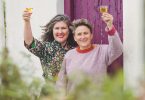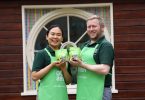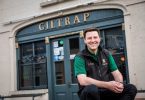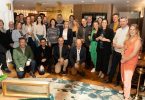Fiona Buckley – connecting with the tourist
Much has been made of the role of the Irish pub in the tourism drive. As Head of Insights, Futures & Strategic Partnerships at Fáilte Ireland Fiona Buckley must interpret all the data gathered by Fáilte Ireland and assimilate conclusions based on the findings.
That’s why I thought it would be interesting to talk to her about how some of the trends Fáilte Ireland has discovered might affect the licensed trade in particular.
‘Globalisation’ is one trend, for example.
“The effect of ‘globalisation’ means that world’s getting ‘nearer’ and historical points of cultural distinction are becoming increasingly homogenous as we can effectively buy anything from anywhere at any point in time. People are constantly in pursuit of ‘something different’ but this ‘different’ is hard to find because ‘different’ has a very short shelf-life. So and there’s an escalating need for ‘authenticity’ – a driver of ‘localisation’. Localisation and authenticity are central to the travel and tourism industry which is growing year-on-year. At the current pace of growth, international tourism is set to double from one billion to two billion between 2013 and 2035.

Fiona Buckley: “People are constantly in pursuit of ‘something different’ but this ‘different’ is hard to find because ‘different’ has a very short shelf-life”.
Trend for localisation
Ireland, as a tourism destination, offers a truly authentic local experience, “… a place, a culture – the Irish Pub concept, which epitomises ‘all things local’,” she says.
This ‘all things local’ approach is really important for creating and maintaining a strong Point Of Difference for Ireland.
“Today’s tourists are accomplished in their ability to research and plan before arrival” says Fiona, “but they also want to discover local experiences and uncover ‘local surprises’ for themselves when they get there – unexpected experiences which they can not only brag about when they return home, but which hold as lifelong memories which they likely wouldn’t find promoted in international travel information.”
Trend for ‘authenticity’
‘Authenticity’ is a ‘buzz’ word just now but Fiona feels that it’s also frequently over-used, particularly when ‘mass-produced’ is promoted as being authentic. Consumers can see beyond that, she believes, “They do know authenticity and they get something here in Ireland that isn’t contrived, something that is ‘of’ Ireland and can only be experienced here.
“Cities like New York and Amsterdam are well-established tourist destinations and the industry there has adapted and responded to the tourist to the point that some locals are increasingly feeling alienated. These cities are now actively paying more attention to the locals as they are critical to an authentic sense of place. There are learning’s here for Dublin, for example.
“Local businesses and local people not only create an energy and vibe but they, very importantly, ensure that visitors find a true ‘Dubliner’s Dublin’ which isn’t contrived or ‘false’.
“Our research indicates that although tourists want local interaction, they’re not always seeing it in certain quarters.”
“Visitors want to easily explore our cities, towns and villages and experience ‘less touristy’ restaurants and bars where they can integrate with the locals where the locals live and socialise and get great local food and local entertainment, banter and stories.”
Tourists want to be able to find traditional Irish entertainment in a nice ambience, so if you’ve got music, get the message out there and work with neighbouring pubs to pull it together a programme of sessions and ensure that local businesses know to spread the word so that visitors know, she advises.
Fiona sees a particular need to ensure that visitors can engage with locals.
“It’s also really important to look after your local business – be credible and relevant for locals and tourists will want to follow.”
Most of these trend-drivers manifest themselves most significantly through food in the Irish pub.
The food & entertainment story
Once again authenticity is really important here, believes Fiona.
“Food is very much top-of-mind with visitors when they come here,” she says, “Increasingly visitors consider food less as a fundamental and more so an important part of the overall Irish experience.
“Food allows people communicate and understand the culture of Ireland, particularly when that food is locally-caught or locally-sourced and tells a story of the locality and the people who live or lived there. The ability of local staff to be able to talk about their food offering really engages customers – being told that it was ‘freshly caught fish by local fishermen’, for example.
“The Atlantic coastal culture is central to the Wild Atlantic Way; it’s a way of life epitomised by Gaelic traditions, dance, stories, music and food from the sea. This really potent and uniquely authentic culture can only be experienced within communities – and the local pub is often the centre of our communities.
“German visitors in particular, when we described that ability to go into an Irish pub and see and listen to Irish music being performed impromptu and even participate, that was something that was both so potent and so motivating for them.”
Fáilte Ireland’s food division works closely with industry to improve the food experience for visitors.
“Encouraging and supporting businesses to present their local ‘place on a plate’ by using locally-sourced ingredients, local cooking and presentation traditions as well as craft beers help the visitor ‘get under the skin’ of the place and the people.
“Food is one of the most photographed and posted of all travel experiences so it’s important to bear in mind that every satisfied ‘image-posting’ guest is happy to brag about his or her food experience, encouraging more business.
“Not only does the visitor get fantastic satisfaction at the point of consumption while here, but their memories and ‘bragging rights’ are shared with others when they get back home.”
Of course in this digital age they’re also taking a picture then and there and posting it to their friends online in real time.
“This, in turn, creates more visible touch-points in the marketplace which gets Ireland increasingly recognised for good food, good ingredients and increasingly for translating those ingredients into fantastic food.
“When the value in food is evident, the tourist does not have a problem paying for it, but if it’s not seen as ‘unique’ or ‘special’ – tea and coffee offerings, for example – then it needs to be good value.”
Changing tourist profile
The profile of the tourist is constantly changing in terms of market and consumer behaviour, she says.
“It is important that we constantly and actively monitor changes and influences as well as monitoring our competition. Clearly travel out of Asia is expected to increase substantially.
“The global population is ageing but the mindset of the older population is getting younger… which has consequences for the type of travel and the types of experiences sought in years to come.
“There’s also growth in the ‘ageing’ population, so we’ll see a lot of older people behaving with a younger mindset,” she says, pointing out that this has implications for how we present our offering.
“There have also been significant changes around consumer motivation for travel to Ireland.”
Fáilte Ireland has conducted extensive research to ensure that it understands these changed drivers deeply and fully, allowing it to prioritise certain types of group and focus on attracting the type of tourist that will help create regionality and allow Ireland be a sustainable tourist destination, “… and which also allows us achieve our objectives around seasonality as well as regionality,” she explains, “The focus is on identifying those tourists within that mix who can help create a more sustainable industry within our communities.”
A lot of research goes into understanding that.
“We are constantly and actively researching and monitoring the market to ensure we understand the market, allowing us to prioritise and focus on competing internationally. We want our tourism industry to be sustainable, with priority objectives around seasonality and regionality; supporting jobs in communities across the country.
For now, Germany, France, North America and Great Britain yield the best results for Ireland and within those markets we have very focused customer groups or segments which we have identified, whose motivations, needs and wants are best suited to what Ireland has to offer and are most likely to travel and spend time and money here.
But the tourism body also targets specific consumer types where it knows that Ireland best meets their motivation.
Consumer needs are changing as the make-up of the consumer groups change, she says, from single-parent families to multi-generational familes who want to travel together.
“People travel at different times of the year so the notion of a traditional holiday time is no longer the norm,” she points out, “And thanks to WiFi many people can also combine holidays with working during the week. This has significant consequences for bars and restaurants providing WiFi.”
In summary, she can’t stress enough that the natural conversation, that local story that connects the guest with the local food and drink you’re selling creates a memorable experience unique to Ireland.








